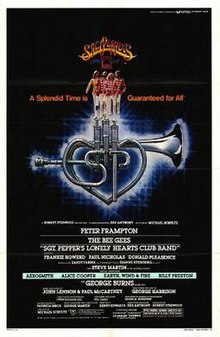Sgt. Pepper's Lonely Hearts Club Band (film)
| Sgt. Pepper's Lonely Hearts Club Band | |
|---|---|

Theatrical release poster
|
|
| Directed by | Michael Schultz |
| Produced by | Robert Stigwood |
| Written by | Henry Edwards |
| Starring | |
| Music by | |
| Cinematography | Owen Roizman |
| Edited by | Christopher Holmes |
|
Production
companies |
|
| Distributed by | Universal Pictures |
|
Release date
|
|
|
Running time
|
111 minutes |
| Country | United States West Germany |
| Language | English |
| Budget | $13 million |
| Box office | $20.4 million |
Sgt. Pepper's Lonely Hearts Club Band is a 1978 American musical comedy film directed by Michael Schultz and written by Henry Edwards. The film tells the loosely constructed story of a band as they wrangle with the music industry and battle evil forces bent on stealing their instruments and corrupting their home town of Heartland. The film is presented in a form similar to that of a rock opera, with the songs providing "dialogue" to carry the story. Only George Burns has spoken lines that act to clarify the plot and provide further narration.
The film's soundtrack, released as an accompanying double album, features new versions of songs originally written and performed by the Beatles. The film draws primarily from two of the band's albums, 1967's Sgt. Pepper's Lonely Hearts Club Band and 1969's Abbey Road. The film covers all of the songs from the Sgt. Pepper album with the exceptions of "Within You, Without You" and "Lovely Rita", and also includes nearly all of Abbey Road.
The production was loosely adapted from Sgt. Pepper's Lonely Hearts Club Band on the Road, a 1974 off-Broadway production directed by Tom O'Horgan.
The film was produced by Robert Stigwood, founder of RSO Records, who had earlier produced Saturday Night Fever. RSO Records also released the soundtrack to the film Grease in 1978, which had Barry Gibb producing and Peter Frampton playing lead guitar on the title track. In 1976, the Bee Gees had recorded three Beatles cover songs, "Golden Slumbers / Carry That Weight", "She Came In Through the Bathroom Window" and "Sun King", for the musical documentary All This and World War II.
...
Wikipedia
